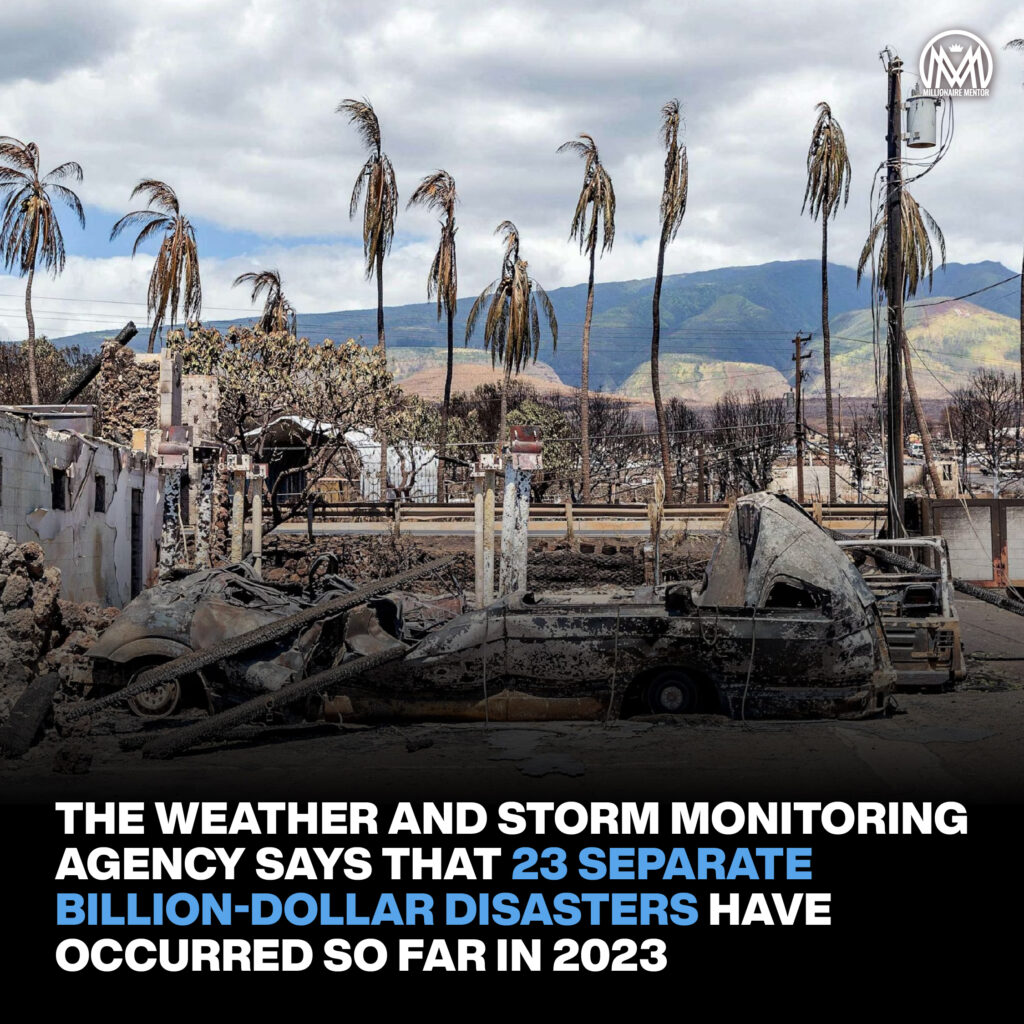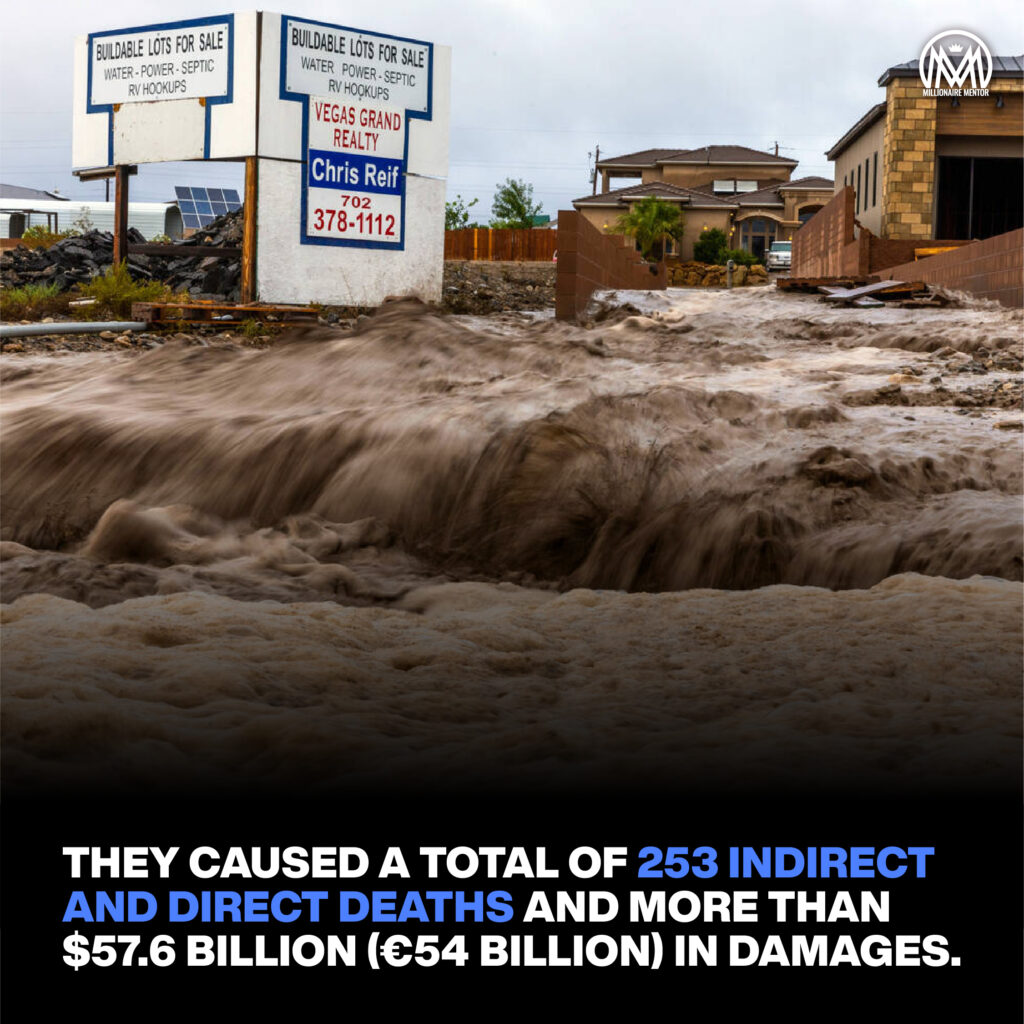The United States has recently experienced an alarming increase in the frequency and severity of climate-related disasters, shattering previous records for billion-dollar climate events. In a year marked by extreme weather events, wildfires, hurricanes, and floods, the nation finds itself at the forefront of the climate crisis. The US sets new record with an unprecedented surge in billion-dollar climate disasters, emphasizing the urgent need for climate action.
US Sets New Record: Rising Frequency and Costs of Billion-Dollar Disasters.
This pivotal moment in the United States’ fight against climate change is marked by a significant surge in billion-dollar disasters. According to the National Oceanic and Atmospheric Administration (NOAA), the US set a new record with an unprecedented number of such events, surpassing the previous high of occurrences in a previous year
These billion-dollar disasters encompass a wide range of natural catastrophes, including hurricanes, wildfires, severe storms, and flooding. The collective cost of these disasters, including property damage, infrastructure repair, and economic disruption, has soared to an astronomical [insert cost] dollars, causing a significant strain on federal and state budgets.
Wildfires: A Burning Concern.
Wildfires have been a particularly devastating climate-related disaster in [insert year]. Unprecedented blazes in states like California, Oregon, and Washington have engulfed homes, forests, and communities. The relentless march of these wildfires has not only resulted in tragic loss of life but also incurred billions of dollars in firefighting costs and property damage. The increasing frequency and intensity of these fires are strongly linked to climate change, as rising temperatures and prolonged droughts create ideal conditions for ignition and rapid spread.
Hurricanes: Relentless Fury.
The Atlantic hurricane season in [insert year] was relentless, with a record-breaking number of named storms, several of which made landfall causing widespread destruction. Hurricanes like [insert hurricane names] left a trail of devastation along the Gulf Coast and Eastern Seaboard, requiring substantial financial resources for recovery efforts. The warming of sea surface temperatures, fueled by climate change, is known to intensify hurricanes, making them more destructive and dangerous.
Flooding: An Inundating Problem.
Flooding events have also played a significant role in the year’s billion-dollar disaster tally. From flash floods to riverine inundation, heavy rainfall events have tested the resilience of communities across the US. Coastal regions, in particular, are vulnerable to sea-level rise, leading to increased flood risk during storm surges and high-tide events. The economic toll of flood damage, which includes infrastructure repair, property loss, and agricultural devastation, is staggering.
Calls for Climate Action.
The surge in billion-dollar climate disasters underscores the urgency of addressing climate change at both national and global levels. Scientists have long warned that greenhouse gas emissions are driving more extreme weather events, putting lives and livelihoods at risk. The need to reduce carbon emissions, transition to renewable energy sources, and invest in climate resilience measures has never been more pressing.
Federal and state governments must prioritize climate adaptation and mitigation strategies to protect communities and reduce the financial burden of disasters. This includes strengthening building codes, investing in green infrastructure, and supporting renewable energy initiatives.
In addition to government action, individuals, businesses, and communities also have a crucial role to play in reducing their carbon footprint and preparing for the realities of a changing climate. Sustainable practices, such as energy conservation, responsible land management, and disaster preparedness, are essential components of a collective response to the climate crisis.
The United States’ record-breaking year for billion-dollar climate disasters is a stark reminder that climate change is no longer a distant threat; it is a present reality with devastating consequences. The time for action is now. By prioritizing climate resilience and reducing emissions, we can hope to mitigate the severity of future disasters and protect our planet for generations to come. It is not only a matter of environmental responsibility but also one of economic necessity and human survival.


Trending News Articles
 Airlines Kneel To ‘Fat Positivity’, Want YOUR Money To Pay For FREE Seatsby Jason Stone●January 2, 2024
Airlines Kneel To ‘Fat Positivity’, Want YOUR Money To Pay For FREE Seatsby Jason Stone●January 2, 2024 Jordan Peterson Leaves VICE Journalist SPEECHLESS On Sexual Harassment!by Jason Stone●February 18, 2023
Jordan Peterson Leaves VICE Journalist SPEECHLESS On Sexual Harassment!by Jason Stone●February 18, 2023 100’s Of Anxious Amazon Employees Express Disappointment And Frustration Over The Abrupt Implementation Of The Company’s Return-to-office Mandate.by Jason Stone●February 22, 2023
100’s Of Anxious Amazon Employees Express Disappointment And Frustration Over The Abrupt Implementation Of The Company’s Return-to-office Mandate.by Jason Stone●February 22, 2023 ChatGPT cost a fortune to make with OpenAI’s losses growing to $540 million last year.by Jason Stone●May 6, 2023
ChatGPT cost a fortune to make with OpenAI’s losses growing to $540 million last year.by Jason Stone●May 6, 2023






